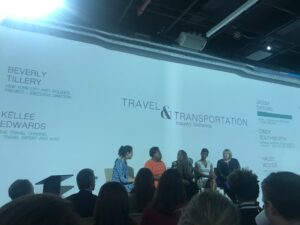Galvanizing Industry Leaders for Impact
Women’s safety in the travel, transportation, and tech industries
Safety Concerns are Universal
Safety and inclusion concerns are nearly universal for women and marginalized groups when they travel. 76% of women say safety concerns have a significant impact on where they travel[1] and 55% of LGBTQ+ travelers have experienced discrimination when traveling.[2] Importantly, these groups will reward companies that address their concerns with 46% of women saying they would travel more if safety wasn’t a concern[1] and 64% of LGBTQ+ travelers being more likely to book with brands that support the LGBTQ+ community.[2]
There is a clear need to address the safety and inclusion of women and marginalized groups across the travel and transportation industry and tremendous opportunity for the companies that create safe spaces for these communities.
 Competitors or Collaborators?
Competitors or Collaborators?
While at Uber, Tracey Breeden and her team focused on helping the company do its part to address the concerns of women and LGBTQ+ users. We quickly realized, though, that if Uber was to truly create a safer platform and shift the narrative on safety, it needed to help improve safety and inclusion and shift the narrative of the broader industry. Uber riders and drivers used all rideshare options and bad actors could move from one platform to another, adversely impacting perception and actual safety for the entire rideshare industry.
Additionally, the safety issues that affected Uber didn’t just impact its direct competitors, but impacted companies throughout the broader travel and transportation industry as well. Since the problem was industry-wide, the solution had to be too. We set out to do three things: 1) Demonstrate that Uber was a leader in safety, 2) Provide the broader industry with the information and tools needed to improve safety on their own platforms, and 3) Encourage partnership within the industry and outside with third-party experts
We worked to be collaborators on safety, not competitors.
Safety as a Core Competency, not a Competitive Advantage
We built off of our prior work on Uber’s Driving Change initiative and created an off-the-record industry gathering packed with safety research insights, third-party expert panels, and industry-wide safety best practices and resources. We brought together executives from the technology, airline, hotel, homeshare, and rental car industries to absorb shared knowledge and answer the question, “How can we work together to improve the safety of women and marginalized groups?”
This began with grounding all attendees with common knowledge about the experience of women and marginalized groups while traveling. Custom research revealed women’s and marginalized communities’ primary concerns, the experiences of travel industry employees, and what actions would make each of these groups feel safer.
We leveraged the partnerships established with Uber’s Driving Change initiative to host panels on the unique experiences of women and Black and trans individuals. These partners also helped moderate a brainstorming exercise amongst the executives of the attending organizations to improve the safety of the most marginalized on their platforms.
Finally, we shared a white paper featuring a taxonomy that Uber developed in partnership with third-party experts to categorize sexual harm and misconduct. This taxonomy was shared as a resource that anyone in the industry could use to better quantify the harms on their respective platform to improve their safety efforts.
 New Standards for the Industry
New Standards for the Industry
This event was the first step in inspiring the travel, transportation, and tech industries to do more for the safety of women and marginalized communities. The taxonomy presented by Uber has been adopted by competitors and used as the foundation for their Safety Reports. Publishing Safety and Transparency Reports has become a more common practice amongst tech peers and has even begun to expand to other industries such as online dating, social discovery, and homeshare.
Many of the companies present forged partnerships with the same or similar safety organizations that Uber had partnered with, making third-party expert collaborations a more common industry practice. Some of these partners even developed separate divisions in their organizations to better engage with corporations looking to create safer experiences.
The gathering inspired several informal working groups amongst the employees in attendance to swap ideas and further develop strategy and Uber was recognized with the Silver Adrian Award for Public Relations for hosting the event. The hope and belief for the future is that this event is only the start of further safety collaborations amongst travel, transportation, and tech.

 New Standards for the Industry
New Standards for the Industry